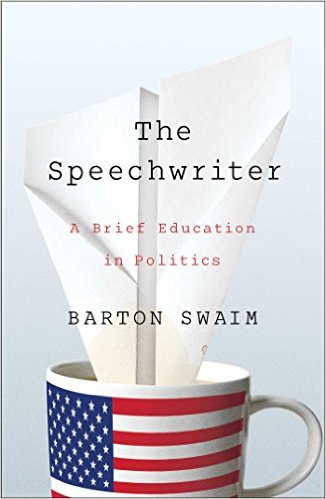We will discuss Barton Swaim’s The Speechwriter: A Brief Education in Politics at our meeting on Wednesday, March 29th at 4:15p.m. in the GAHS library. Please post questions, comments, concerns, criticism, and the like on this blog prior to, during, or after our meeting (before April 1st if you want extra credit). All questions and responses should indicate an active reading of the text and function to move the conversation forward. (Note: surface-level or obvious questions and responses will not count as participation.)
Those of you unable to attend due to scheduling conflicts may participate in the discussion below by posting a discussion question and offering a detailed response, or by responding to two questions already posted. The note above applies here as well, so heed it!

I guess throughout the book I was searching for ways that Swaim’s experience with the Governor affected his outlook, but was surprised by an overall lack of political skew. At the beginning, I took him for a slightly liberal persona, but by the end was unsure of his political associations. Sure, there was some discussion of policy when Swaim spoke of the Governor’s adversarial position to the stimulus package and dead child laws, but even then presented it in a fairly reasonable light. Regardless, I wondered whether working for a governor like Sanford might become grounds for disillusionment in the political system. There was a point in the book where Swaim made an offhand comment about how all men who make it anywhere in politics have to be obsessed with their image and brand that gave me the first glimpse of dissuasion from the political realm. Of course, Swaim’s spiel near the end of the book advocating against trusting politicians also provides some evidence for the cynical effect politics contains, but despite these marks against idealism and a slightly sardonic tone much of the book maintains, Swaim never truly descends past mild sarcasm into deep cynisism. Obviously, the political fallout of Governor Stanford gives the overall narrative an emotional edge, but the writing doesn’t harbor much resentment, and Swaim spends almost as much time on the team’s abilities and successes as he does on the obstacles they face in furthering Stanford’s political career. In all likelihood, as long as an individual’s identity isn’t too tied up in the politician he’s working with, disillusionment shouldn’t be too large of a problem.
Beginning with the title, “The Speechwriter: A Brief Education in Politics”, there could be two meanings behind it. The first being the reader’s brief education in Politics through the narrative of Barton Swaim. The second being Swaim’s, the speechwriter’s, education in politics through his work with the narcissistic Governor Sanford from 2007-2010.
To me, the overall purpose of Swaim’s narrative wasn’t to illustrate the rise and fall of a certain narcissistic politician, or to relate to other speechwriters out there who can’t write using their own voice, or even to point out how bad of a writer the governor was and how he couldn’t do anything for himself. That’s only on the surface. If you look a little further into the reasoning & pay attention to the even the small interactions throughout the story- Swaim and his wife conversing & laughing over the politicians actions- it comes out to be a story about the readers. How, us as citizens in this extremely political country, who tend to worship the powerful, need to learn how to thrive off of the disappointment provided for us by our politicians & the people we believe in. It’s not saying all politicians are bad & are going to fail us eventually. It is bringing the reader’s attention to the fact the high and mighty, really aren’t so high and mighty.
Sanford’s scandal brought down his entire administration, they became a national laughing stock, but Sanford had nothing to say. He may have apologized, but those weren’t his words, those weren’t his feelings. They were the thoughts and emotions of his writers who found it almost impossible to write an apology for someone who in no way had any regret or guilt. The governor’s followers believed in him, but he let them down. Something that tends to be abundant in this egotistical world today. Swaim states how Politicians are corrupted by, “the praise, the fawning, the seriousness with which people take their remarks, the gaze of audiences, the way a crowded room falls silent when they enter.” Citizens worship their leaders without knowing their true identity & beliefs.
Another point I noticed and enjoyed which was made throughout the writing was how Barton Swaim glorified the job of the speechwriter- “a person whose job it was to put words in the mouths of the powerful, who understood the important and varieties of political language and guided his master through its perils,”(10). – but as the story continued, the job became less and less enchanting. As stated on page 33 when Swaim was having a laughable conversation with his wife about the Governors “episodes” he admitted to how they really made him unhappy. Why is a career he once had a passion for causing him despair? More importantly, once the administration crashed & burned, Swaim,”… felt somehow liberated,”(159). We were able to experience the glorification of such a powerful job, dwindle away.
I enjoyed how Swaim fought for his voice and individualism with his writing. It was hard for him to stray away from his voice and adapt the voice of the Governor. Although, the crash & burn of the administration was difficult at first, in the end, it helped all of the writers. They were able to eventually have their own voice back, they felt free.
What do you think about my opinion on the purpose of the novel?
What do you think was the overall purpose? How did it impact you?
Did the novel change your view on politicians or political figures?